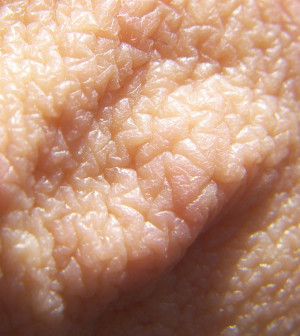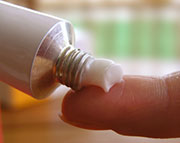- Could Your Grocery Store Meat Be Causing Recurring UTIs?
- Are You Making This Expensive Thermostat Error This Winter?
- Recognizing the Signs of Hypothyroidism
- 10 Strategies to Overcome Insomnia
- Could Artificial Sweeteners Be Aging the Brain Faster?
- Techniques for Soothing Your Nervous System
- Does the Water in Your House Smell Funny? Here’s Why
- Can a Daily Dose of Apple Cider Vinegar Actually Aid Weight Loss?
- 6 Health Beverages That Can Actually Spike Your Blood Sugar
- Treatment Options for Social Anxiety Disorder
Exfoliate With Care, Dermatologist Urges


If you plan to exfoliate, get some professional advice first, a dermatologist suggests.
“Before you exfoliate, you really need to understand your skin and skin type,” Dr. Mary Lupo, a clinical professor of dermatology at Tulane University School of Medicine in New Orleans, said in an American Academy of Dermatology news release.
“A board-certified dermatologist can help you choose the exfoliation option that’s best-suited to your skin’s unique needs,” she added.
Exfoliation removes the topmost layer of dead skin cells and can be done by applying acid that dissolves the cells (chemical) or by using a brush or scrub to physical remove the cells (mechanical).
People who might benefit from exfoliation include those who’ve experienced premature aging because of sun damage and those with noninflammatory acne, which is acne with only blackheads and whiteheads, Lupo said.
If you have dry or sensitive skin, use milder chemical options, such as salicylic acid peels administered in a dermatologist’s office. People with oily, thicker skin may be able to use stronger chemical treatments, such as an over-the-counter salicylic acid wash, or mechanical treatments such as a motorized brush or scrub, Lupo said.
Your skin type and the strength of the treatment method determines how often you should exfoliate. People with dry or sensitive skin may need to limit at-home treatments to once a week, while those with oily, thicker skin may be able to exfoliate as often as once a day, Lupo said.
Be careful when buying exfoliation products in stores and online because not all of them are safe and effective, she warned.
Before you buy, confirm that a product is from a recognized, reputable company, Lupo advised. When purchasing over-the-counter chemical products, choose those with low acid concentrations — no higher than 10 percent glycolic acid or 2 percent salicylic acid, she said.
More information
The U.S. National Library of Medicine has more about skin conditions.
Source: HealthDay
Copyright © 2026 HealthDay. All rights reserved.










